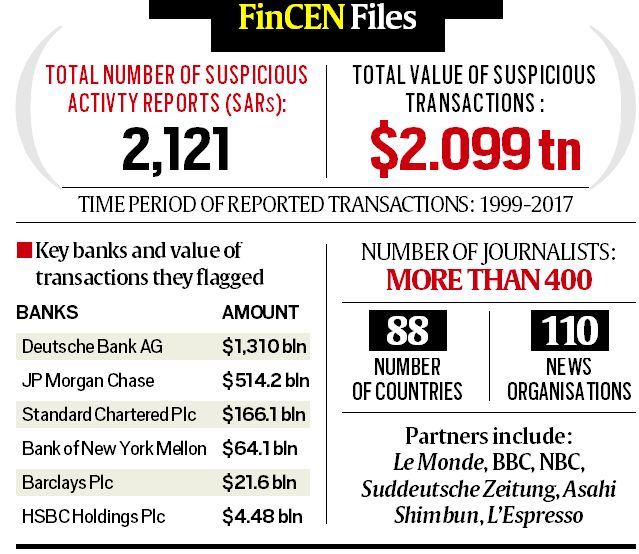- India
- International
Swiss Leaks, Panama Papers, now SARs: bank reports that alert law-enforcement agencies
The files identify at least $2 trillion in transactions between 1999 and 2017 flagged as possible evidence of money laundering or other criminal activity by compliance officers of banks and financial institutions.
 From steel major to IPL sponsor, diamond merchants to those under ED, CBI scanner, several Indian individuals and entities have been referred in secret reports by banks to US Treasury’s Financial Crimes Enforcement Network.
From steel major to IPL sponsor, diamond merchants to those under ED, CBI scanner, several Indian individuals and entities have been referred in secret reports by banks to US Treasury’s Financial Crimes Enforcement Network.What are the FinCEN Files?
The FinCEN Files refer to a set of over 2,100 “Suspicious Activity Reports” (SARs) (see next question) filed by banks with the United States Department of the Treasury’s Financial Crime Enforcement Network, the agency that serves as the leading global regulator in the battle against money laundering.
The files identify at least $2 trillion in transactions between 1999 and 2017 flagged as possible evidence of money laundering or other criminal activity by compliance officers of banks and financial institutions.
So what is a SAR? When are they required to be filed?
SAR or Suspicious Activity Report is a document filed by banks and financial institutions to report suspicious activity to US authorities, in this case, FinCEN. These are confidential, so secret that banks are not allowed to confirm their existence. Indeed, even the account holder is unaware when an SAR is filed related to a transaction in that account.
SARs are filed with FinCEN in a prescribed format, and are meant to red flag, within 30 days of the transaction’s occurrence: criminal funds or any form of dirty money; insider trading; potential money laundering; terror financing; any transaction that raises suspicion.
These include round-dollar amounts — for example, $100,000 — being sent in multiple transactions; transfers where there is no apparent economic connection between the parties (a diamond dealer paying a pizzeria for computer parts); transactions in high-risk jurisdictions (offshore havens, conflict zones); transactions to/by PEPs (politically exposed persons) and, finally, adverse media reports on the parties.

 The FinCen Files
The FinCen Files
Who can file SARs?
Banks, of course, but now that list has been expanded to include money exchanges, securities brokers, casinos. Non-filing of SARs can invoke hefty penalties. In recent years, Deustche Bank, HSBC and Standard Chartered Bank, among others, have been slapped with huge fines for improper oversight. Credit card systems are not required to file SARs and all filers are required to keep records of SARs for five years.
FinCEN Files | ‘Tricks and cunning’: Big penalties don’t stop banks from moving dirty cash
But is SAR evidence of criminality, illegality? If not, what’s its signficiance?
A SAR is not an accusation, it is a way to alert regulators and law enforcement to possible irregular activity and crimes. FinCEN shares SARs with law-enforcement authorities including FBI, US Immigration and Customs; they are used to detect crime but cannot be used as direct evidence to prove legal cases. In the world of international finance where money moves under several layers to escape or avoid taxation, SARs are the first red flags.
Read | Revealed: how Jindal Steel sent funds abroad, and got them in same period
Is there an equivalent of the SAR in India?
Yes. The Financial Intelligence Unit-India (FIU-IND) performs the same functions as FinCEN in the US. Under the Finance Ministry, this was set up in 2004 as the nodal agency for receiving, analyzing and disseminating information relating to suspect financial transactions.
The agency is authorised to obtain cash transaction reports (CTRs) and suspicious transaction reports (STRs) and cross border wire transfer reports from private and public sector banks every month under the Prevention of Money Laundering Act (PMLA). It is mandatory for banks in India to furnish a monthly CTR to the FIU on all transactions over Rs 10 lakh or its equivalent in foreign currency or a series of integrally connected transactions that add up to more than Rs 10 lakh or its equivalent in foreign currency.
The STRs and CTRs are analysed by FIU and suspicious or doubtful transactions are shared with agencies like the Enforcement Directorate, the Central Bureau of Investigation and the Income Tax for the purpose of launching probes to check possible instances of money laundering, tax evasion and terror financing. FIU’s 2017-2018 annual report reveals that it had received a record number of 14 lakh STRs following demonetization which was three times the number of STRs filed in the previous year.
Read | On US radar: Dawood Ibrahim’s financier, his laundering, funding of Lashkar, Jaish
How does FinCEN Files build on Panama Papers, Paradise Papers and the series of offshore leaks?
Countries keep their bank transaction alerts within their borders. FinCEN files signals that after the series of disclosures and leaks of offshore holdings in tax havens, the veil of confidentiality can be lifted even from bank and wire transfers.
One benchmark was the publication of the Panama Papers in 2016 and as the ICIJ calculated last year, the total tax collected following the global media investigation was $ 1.2 billion.
In India, figures given by the Central Board of Direct Taxes (CBDT) is not for tax collected but undeclared tax collected which till mid-2019 stood at Rs 1,564 crore.
📣 Express Explained is now on Telegram. Click here to join our channel (@ieexplained) and stay updated with the latest
What leads could FinCEN files give investigators in India?
The clear message for agencies in India is that their cases of financial fraud and corruption are being flagged by the world’s most powerful regulator. For, the FinCEN Files contain SAR which, in many cases of Indian entities and individuals, mention their financial history of alleged irregularities. There are details of banking transactions that give a clear indication of round-tripping, money laundering or dealings with shell-like entities. For the Indian banking sector, the FinCEN Files highlight the dangers correspondent banking pose and raise the very pertinent question: were the thousands of transactions involving Indian entities and individuals red-flagged by FinCEN also red-flagged by banks to the FIU here, especially since 44 Indian banks have been named in the secret data, and if so, what was the outcome?
How did these files come to ICIJ and The Indian Express?
These records were gathered by Congressional committees investigating Russian interference in the 2016 US presidential election. BuzzFeed News obtained these records and shared them with the International Consortium of Investigative Journalists. ICIJ has partnered with a team of news organisations, to investigate the secret world of banks and money laundering. The Indian Express is its partner in India.
Read | Bank reported fraud, UK link of an IPL team sponsor
BuzzFeed News referred to these SARs in 2018 to reveal secret payments to shell companies controlled by Paul Manafort, who is now serving a federal prison sentence at home in a case based largely on these transactions. A former US Treasury Department official, Natalie Mayflower Sours Edwards, has been charged with conspiring to unlawfully disclose documents to Buzzfeed. Buzzfeed has not commented on its source.
More Explained
EXPRESS OPINION
Apr 26: Latest News
- 01
- 02
- 03
- 04
- 05











































